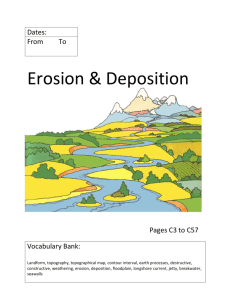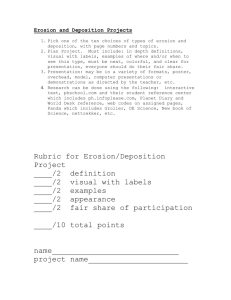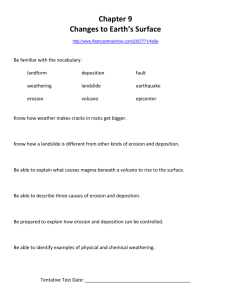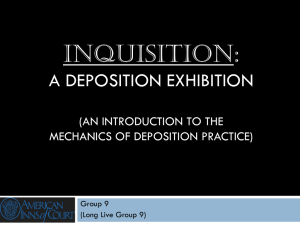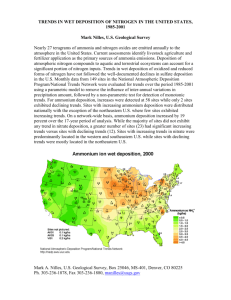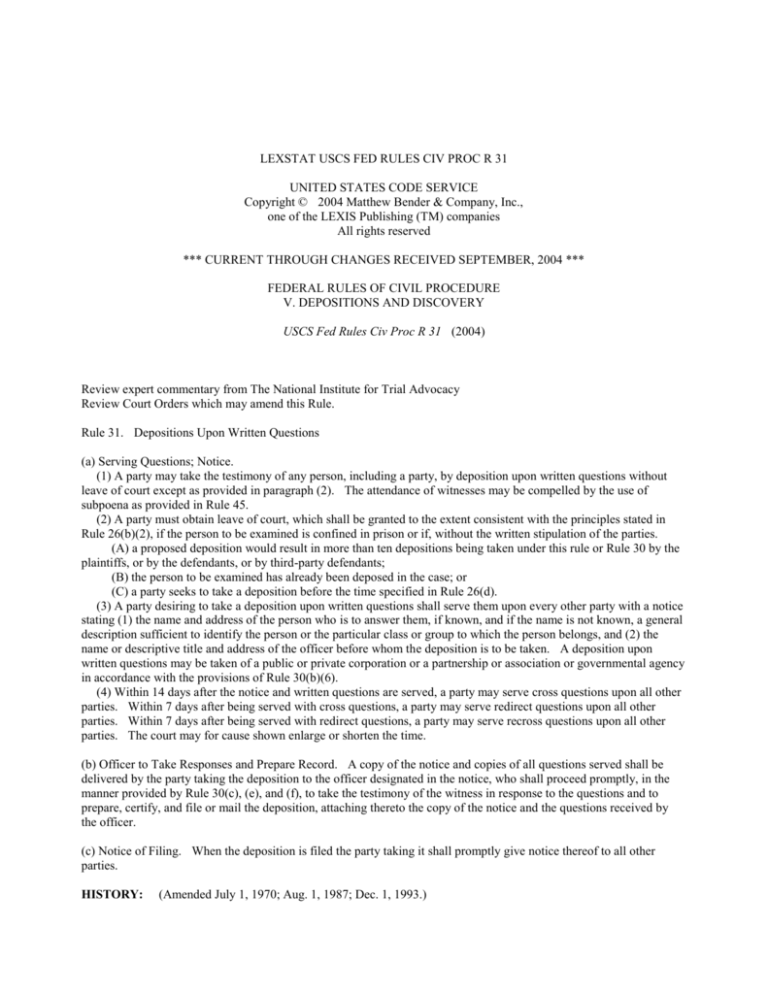
LEXSTAT USCS FED RULES CIV PROC R 31
UNITED STATES CODE SERVICE
Copyright © 2004 Matthew Bender & Company, Inc.,
one of the LEXIS Publishing (TM) companies
All rights reserved
*** CURRENT THROUGH CHANGES RECEIVED SEPTEMBER, 2004 ***
FEDERAL RULES OF CIVIL PROCEDURE
V. DEPOSITIONS AND DISCOVERY
USCS Fed Rules Civ Proc R 31 (2004)
Review expert commentary from The National Institute for Trial Advocacy
Review Court Orders which may amend this Rule.
Rule 31. Depositions Upon Written Questions
(a) Serving Questions; Notice.
(1) A party may take the testimony of any person, including a party, by deposition upon written questions without
leave of court except as provided in paragraph (2). The attendance of witnesses may be compelled by the use of
subpoena as provided in Rule 45.
(2) A party must obtain leave of court, which shall be granted to the extent consistent with the principles stated in
Rule 26(b)(2), if the person to be examined is confined in prison or if, without the written stipulation of the parties.
(A) a proposed deposition would result in more than ten depositions being taken under this rule or Rule 30 by the
plaintiffs, or by the defendants, or by third-party defendants;
(B) the person to be examined has already been deposed in the case; or
(C) a party seeks to take a deposition before the time specified in Rule 26(d).
(3) A party desiring to take a deposition upon written questions shall serve them upon every other party with a notice
stating (1) the name and address of the person who is to answer them, if known, and if the name is not known, a general
description sufficient to identify the person or the particular class or group to which the person belongs, and (2) the
name or descriptive title and address of the officer before whom the deposition is to be taken. A deposition upon
written questions may be taken of a public or private corporation or a partnership or association or governmental agency
in accordance with the provisions of Rule 30(b)(6).
(4) Within 14 days after the notice and written questions are served, a party may serve cross questions upon all other
parties. Within 7 days after being served with cross questions, a party may serve redirect questions upon all other
parties. Within 7 days after being served with redirect questions, a party may serve recross questions upon all other
parties. The court may for cause shown enlarge or shorten the time.
(b) Officer to Take Responses and Prepare Record. A copy of the notice and copies of all questions served shall be
delivered by the party taking the deposition to the officer designated in the notice, who shall proceed promptly, in the
manner provided by Rule 30(c), (e), and (f), to take the testimony of the witness in response to the questions and to
prepare, certify, and file or mail the deposition, attaching thereto the copy of the notice and the questions received by
the officer.
(c) Notice of Filing. When the deposition is filed the party taking it shall promptly give notice thereof to all other
parties.
HISTORY:
(Amended July 1, 1970; Aug. 1, 1987; Dec. 1, 1993.)
Page 2
USCS Fed Rules Civ Proc R 31
HISTORY; ANCILLARY LAWS AND DIRECTIVES
Other provisions:
Notes of Advisory Committee on Rules. This rule is in accordance with common practice. In most of the states listed
in the Note to Rule 26(a), provisions similar to this rule will be found in the statutes which in their respective statutory
compilations follow those cited in the Note to Rule 26(a).
Notes of Advisory Committee on 1970 amendments. Confusion is created by the use of the same terminology to
describe both the taking of a deposition upon "written interrogatories" pursuant to this rule and the serving of "written
interrogatories" upon parties pursuant to Rule 33. The distinction between these two modes of discovery will be more
readily and clearly grasped through substitution of the word "questions" for "interrogatories" throughout this rule.
Subdivision (a). A new paragraph is inserted at the beginning of this subdivision to conform to the rearrangement of
provisions in Rules 26(a), 30(a), and 30(b).
The revised subdivision permits designation of the deponent by general description or by class or group. This
conforms to the practice for depositions on oral examination.
The new procedure provided in Rule 30(b)(6) for taking the deposition of a corporation or other organization through
persons designated by the organization is incorporated by reference.
The service of all questions, including cross, redirect, and recross, is to be made on all parties. This will inform the
parties and enable them to participate fully in the procedure.
The time allowed for service of cross, redirect, and recross questions has been extended. Experience with the existing
time limits shows them to be unrealistically short. No special restriction is placed on the time for serving the notice of
taking the deposition and the first set of questions. Since no party is required to serve cross questions less than 30 days
after the notice and questions are served, the defendant has sufficient time to obtain counsel. The court may for cause
shown enlarge or shorten the time.
Subdivision (d). Since new Rule 26(c) provides for protective orders with respect to all discovery, and expressly
provides that the court may order that one discovery device be used in place of another, subdivision (d) is eliminated as
unnecessary.
Notes of Advisory Committee on 1987 amendments. The amendments are technical. No substantive change is
intended.
Notes of Advisory Committee on 1993 amendments. Subdivision (a). The first paragraph of subdivision (a) is
divided into two subparagraphs, with provisions comparable to those made in the revision of Rule 30. Changes are
made in the former third paragraph, numbered in the revision as paragraph (4), to reduce the total time for developing
cross-examination, redirect, and recross questions from 50 days to 28 days.
NOTES:
CROSS REFERENCES
Depositions before action or pending appeal, USCS Rules of Civil Procedure, Rule 27.
Persons before whom depositions may be taken, USCS Rules of Civil Procedure, Rule 28.
Stipulations regarding depositions, USCS Rules of Civil Procedure, Rule 29.
Depositions upon oral examination, USCS Rules of Civil Procedure, Rule 30.
Written interrogatories of a party, USCS Rules of Civil Procedure, Rule 33.
RESEARCH GUIDE
Federal Procedure:
1 Moore's Federal Practice (Matthew Bender 3d ed.), Service and Filing of Pleadings and Other Papers § 5.33.
1 Moore's Federal Practice (Matthew Bender 3d ed.), Time § § 6.04, 6.06.
6 Moore's Federal Practice (Matthew Bender 3d ed.), General Provisions Governing Discovery; Duty of Disclosure
§ § 26.25, 26.41, 26.60, 26.105, 26.152.
6 Moore's Federal Practice (Matthew Bender 3d ed.), Persons Before Whom Depositions May Be Taken § 28.12.
6 Moore's Federal Practice (Matthew Bender 3d ed.), Stipulations Regarding Discovery Procedure § 29.04.
7 Moore's Federal Practice (Matthew Bender 3d ed.), Depositions Upon Oral Examination § 30.05.
7 Moore's Federal Practice (Matthew Bender 3d ed.), Depositions Upon Written Questions § § 31.02, 31.04,
31.10-,31.14.
7 Moore's Federal Practice (Matthew Bender 3d ed.), Use of Depositions in Court Proceedings § § 32.01, 32.21,
32.25, 32.46.
7 Moore's Federal Practice (Matthew Bender 3d ed.), Interrogatories to Parties § § 33.05, 33.20.
Page 3
USCS Fed Rules Civ Proc R 31
7 Moore's Federal Practice (Matthew Bender 3d ed.), Failure to Make Disclosure or Cooperate in Discovery:
Sanctions § 37.91.
25 Moore's Federal Practice (Matthew Bender 3d ed.), Depositions § 615.11.
6A Fed Proc L Ed, Class Actions § 12:335.
9 Fed Proc L Ed, Criminal Procedure § § 22:1081, 1082.
10 Fed Proc L Ed, Discovery and Depositions § § 26:7, 9, 17, 70, 178, 238, 241, 264, 322-329, 340, 374.
10A Fed Proc L Ed, Discovery and Depositions § § 26:441, 476, 621, 638, 648, 669, 679, 714, 715.
12A Fed Proc L Ed, Evidence § § 33:539, 578.
15 Fed Proc L Ed, Freedom of Information § 38:513.
23A Fed Proc L Ed, Monopolies and Restraints of Trade § 54:306.
27 Fed Proc L Ed, Pleadings and Motions § § 62:52, 55, 115.
27A Fed Proc L Ed, Pleadings and Motions § 62:423.
28 Fed Proc L Ed, Pretrial Procedure § § 64:1. 10, 11.
28 Fed Proc L Ed, Process § § 65:255, 261, 278.
32 Fed Proc L Ed, Trademarks § 74:273.
Am Jur:
9 Am Jur 2d, Bankruptcy § 545.
23 Am Jur 2d, Depositions and Discovery § § 2, 15, 79, 101-103, 203.
29A Am Jur 2d, Evidence § § 1040, 1189.
32B Am Jur 2d, Federal Courts § 2110.
48A Am Jur 2d, Labor and Labor Relations § § 3675, 4596.
54 Am Jur 2d, Monopolies, Restraints of Trade, and Unfair Trade Practices § 547.
62A Am Jur 2d, Pretrial Conference and Procedure § 27.
62B Am Jur 2d, Private Franchise Contracts § 847.
Am Jur Trials:
4 Am Jur Trials, Discovery--Written Interrogatories, p. 1.
12 Am Jur Trials, Actions on Life Insurance Policies, p. 549.
75 Am Jur Trials, Age Discrimination in Employment Action Under ADEA, p. 363.
88 Am Jur Trials, Resolving Real Estate Broker's Disputes, p. 321.
Forms:
8 Fed Procedural Forms L Ed, Discovery and Depositions (2001) § § 23:123-23:127, 23:136-23:140,
23:143-23:146, 23:148, 23:149, 23:218-23:222, 23:243, 23:244, 23:246, 23:254.
8A Am Jur Pl & Pr Forms (2004), Deposition and Discovery, § § 79, 138, 255, 258, 259, 261-263, 266, 271-273,
630.
11A Am Jur Pl & Pr Forms (1998), Federal Practice and Procedure, § § 749, 750, 785-789, 792, 796-799, 852-854,
859, 860.
11B Am Jur Pl & Pr Forms (1998), Federal Practice and Procedure, § 1520.
Annotations:
Discovery, under Federal Rules of Civil Procedure, in actions brought by private plaintiffs under equal employment
opportunity provisions of Civil Rights Act of 1964, as amended (42 USCS § § 2000e et seq.). 31 ALR Fed 657.
Dismissal of state court action for failure or refusal of plaintiff to appear or answer questions at deposition or oral
examination. 32 ALR4th 212.
Taking deposition or serving interrogatories in civil case as waiver of incompetency of witness. 23 ALR3d 389.
Construction and effect of Federal Rules of Civil Procedure, and similar state statutes and rules, relating to
preventing, limiting, or terminating and taking of depositions. 70 ALR2d 685.
Taxation of costs and expenses in proceedings for discovery or inspection. 76 ALR2d 953.
Pretrial deposition-discovery of opinions of opponent's expert witnesses. 86 ALR2d 138.
Texts:
Danner, Pattern Discovery: Employment Discrimination.
Danner, Pattern Deposition Checklists 2d.
Page 4
USCS Fed Rules Civ Proc R 31
Danner, Pattern Discovery: Securities.
Schweitzer, Cyclopedia of Trial Practice (2d ed).
Law Review Articles:
Blumenkopf. Deposition Strategy and Tactics. 5 Am Journal of Trial Advocacy 231, Fall 1981.
Pike; Willis. The New Federal Deposition-Discovery Procedure: I. 38 Col L Rev 1179.
Johnston. Discovery in Illinois and Federal Courts. 15 John Marshall L Rev 1, Winter 1982.
Zweifach. Depositions under the new Federal Rules, 23 Litig 6, Winter 1997.
Kinsler. Location of party-depositions under Federal Rules of Civil Procedure. 37 Res Gestae 358, February 1994.
Sunderland. Discovery Before Trial under the New Federal Rules. 15 Tenn L Rev 737.
A symposium on the 1993 amendments to the Federal Rules of Civil Procedure. 29 Tort & Ins LJ 467, Spring 1994.
Groves. Depositions and interrogatories under the Federal Rules of Civil Procedure: before and after the 1993
amendments. 29 Tort & Ins LJ 483, Spring 1994 .
Wilson. Rules Pertaining to Discoverability of Expert Opinion Evidence in Federal Court. 27 Tr Law Guide 411,
Fall 1983.
Greenwald. Deposing medical experts. 26 Trial 54.
Graham. Discovery of Experts Under Rule 26(b)(4) of the Federal Rules of Civil Procedure: Part One, An Analytical
Study. 1976 U Ill L F 895.
Schmertz. Written Depositions under Federal and State Rules as Cost-Effective Discovery at Home and Abroad. 16
Villanova L Rev 7.
INTERPRETIVE NOTES AND DECISIONS
1. Generally
2. Construction
3. Whose deposition may be taken
4. Service of cross, redirect and recross questions
5. Officer taking responses and preparing record
6. Form of questions
7. Review of questions with deponent
8. Referral by deponent during testimony
1. Generally
Deposition on interrogatories is but another method of obtaining same information that might be procured by oral
examination if witness were available within jurisdiction of court, and such examinations are investigatory for purpose
of ascertaining facts in order to prepare for trial rather than primarily perpetuation of evidentiary matters. Cronan v
Dewavrin (1949, DC NY) 9 FRD 337.
Object of written interrogatories is to elicit ultimate facts and to save expense and time of litigants. J. C. Nichols
Co. v Mid-States Freight Lines, Inc. (1949, DC Mo) 9 FRD 553.
Oral deposition should not be routinely replaced by written questions since interrogatory format does not permit
probing follow-up questions necessary in all but simplest litigation, counsel is unable to observe demeanor of witness
and evaluate his credibility in anticipation of trial without oral deposition, and written questions provide opportunity for
counsel to assist witness in providing answers so carefully tailored they are likely to generate additional discovery
disputes. Mill-Run Tours, Inc. v Khashoggi (1989, SD NY) 124 FRD 547, 14 FR Serv 3d 948.
2. Construction
Deposition-discovery rules are to be accorded broad and liberal treatment. Hickman v Taylor (1947) 329 US 495,
91 L Ed 451, 67 S Ct 385, 34 Ohio Ops 395 (superseded by statute on other grounds as stated in Hawkins v District
Court of Fourth Judicial Dist. (1982, Colo) 638 P2d 1372) and (superseded by statute on other grounds as stated in
Graham v Gielchinsky (1991) 126 NJ 361, 599 A2d 149); Bergstrom Paper Co. v Continental Ins. Co. (1947, DC Wis)
7 FRD 548.
Rule 31 gives party, not witness, option of conducting deposition by written questions and there is no support for
witness's assertion that his offer to read questions in advance and then decide which questions to answer is protected
Fifth Amendment right., National Life Ins. Co. v Hartford Acci. & Indem. Co. (1980, CA3 Pa) 615 F2d 595, 28 FR Serv
2d 1165.
Page 5
USCS Fed Rules Civ Proc R 31
Rule should be construed to secure just, speedy, and inexpensive determination of actions. Babcock & Wilcox Co. v
North Carolina Pulp Co. (1938, DC Del) 25 F Supp 596.
3. Whose deposition may be taken
Depositions of witnesses upon written interrogatories may be taken under Rule 31. Spaeth v Warner Bros. Pictures,
Inc. (1941, DC NY) 1 FRD 729.
Provision of rule with respect to person who may answer interrogatories and make oath thereto is rather broad, and if
plaintiff in action against corporation desired to have testimony of officer of corporation or employee thereof, it could
be obtained by proceeding under Rule 31. Holler v General Motors Corp. (1944, DC Mo) 3 FRD 296.
Plain language of Rule 31 is that it applies to any person, including a party, and in action claiming wrongful
discharge from employment, had plaintiff, individual employed for indefinite period of time at air base being
constructed in Spain, shown existence of exceptional circumstances, there could have been no proper objection as
matter of principle to his taking of his own deposition in Spain upon written interrogatories under Rule 31. Smith v
Morrison-Knudsen Co. (1958, SD NY) 22 FRD 108, 1 FR Serv 2d 441.
Although court would grant motion to quash subpoena served upon Administrator of National Aeronautics and Space
Administration requiring him to appear for taking of deposition in action to which he was not a party, where it would be
vexatious and oppressive to require Administrator to submit to interrogation that might last for several hours and that
would disturb government business, plaintiff would be allowed to proceed by written interrogatories if he seriously
thought he might elicit some definite information that was germane, and motion would be granted without prejudice to
taking of Administrator's deposition on written interrogatories. Capitol Vending Co. v Baker (1964, DC Dist Col) 36
FRD 45, 8 FR Serv 2d 26A.34, Case 2.
Rules protecting judges from civil suit are significant where discovery of matters occurring in course of his official
duties is sought from him for use in suit to which he is not party, and where plaintiff had addressed interrogatories under
Rule 31 to District Judge before whom his criminal case was tried, for purposes of plaintiff's suit against witness whose
testimony was adverse to plaintiff, motion to quash interrogatories would be granted. Jones v Fire & Casualty Ins. Co.
(1967, DC Conn) 266 F Supp 91, 11 FR Serv 2d 781.
No special privilege or immunity shields person from deposition simply because he or she is attorney, or even
attorney for party to suit; however, discovery may be restricted for good cause and where testimony of attorney is
sought only to establish credibility of other witnesses, any value to person requesting such testimony is outweighed by
risk of delay and serious infringement upon right to counsel; short of prohibiting such deposition, it is hard to imagine
how to protect attorney's mental impressions, opinion, legal theories, or litigation strategy; depositions which might
provide such revelations should not be permitted absent strong showing of necessity or prejudice or hardship in
preparation of case. Walker v United Parcel Services (1980, ED Pa) 87 FRD 360, 23 BNA FEP Cas 1493, 31 FR Serv
2d 407.
Arbitrator may not be deposed in order to a certain bases of award or to impeach such award but where deposition is
requesting information in possession of arbitrator which has directly relevant and probative evidence concerning some
unrelated matter which does not impeach correctness of his decision, arbitrator may be deposed. Bliznik v
International Harvester Co. (1980, ND Ill) 87 FRD 490, 31 FR Serv 2d 151.
Limited discovery from blood donor through anonymous deposition upon court-approved written questions sensibly
balances needs of representative of decedent who received HIV-tainted blood transfusion and concerns of defendant
blood supplier. Diabo v Baystate Medical Ctr. (1993, DC Mass) 147 FRD 6, 25 FR Serv 3d 494.
Attorney, even attorney for party to suit, is subject to being deposed, and courts, which do not favor thwarting
deposition, rarely grant protective order which totally prohibits deposition, unless extraordinary circumstances are
present; request to take deposition of attorney for party may, however, constitute circumstance justifying departure from
normal rule. Mike v Dymon, Inc. (1996, DC Kan) 169 FRD 376.
Taking opposing counsel's deposition should be limited to where party seeking to take deposition has shown that no
other means exist to obtain information than to depose opposing counsel, that information sought is relevant and
non-privileged, and that information is crucial to preparation of case. Jones by & Through Jones v Board of Police
Comm'rs (1997, WD Mo) 176 FRD 625.
High ranking government officials are generally not subject to depositions unless they have some personal
knowledge about matter and party seeking deposition makes showing that information cannot be obtained elsewhere.
Alexander v FBI (1998, DC Dist Col) 186 FRD 1.
4. Service of cross, redirect and recross questions
Page 6
USCS Fed Rules Civ Proc R 31
Deposition of physician under Rule 31 was incomplete and improper, and trial court erred in allowing it into
evidence in personal injury action, notwithstanding that defendants withdrew their offer to put into evidence their
redirect interrogatories and answers where, although in accordance with Rule 31, direct, cross, and redirect
interrogatories were properly served, plaintiff's recross interrogatories were never answered and trial court received in
evidence direct and cross interrogatories and their respective answers. Lipscomb v Groves (1951, CA3 Pa) 187 F2d 40.
In copyright infringement action wherein defendant propounded written interrogatories to three witnesses in Trinidad
and Rule 31 allowed plaintiff within specified number of days after receipt of direct interrogatories to serve
cross-interrogatories on defendant, application of plaintiff to deviate from rule and serve cross-interrogatories after
receipt of answers to direct interrogatories would not be given inasmuch as deviation from accepted practice might lead
to complete upset of accepted practice in copyright cases as well as in other matters, so court would order
cross-interrogatories to be propounded in accordance with Rule 31 and answers to both direct and cross-interrogatories
to be filed simultaneously with court, although, in view of alleged difficulty which plaintiff complained of, court would
allow plaintiff, after filing of answers to direct and cross-interrogatories, to propound additional cross-interrogatories if
he so desired. Baron v Leo Feist, Inc. (1946, DC NY) 7 FRD 71, 72 USPQ 107.
5. Officer taking responses and preparing record
Under Rule 31(b), officer before whom deposition is taken is not permitted to add his own gratuitous comments on
demeanor of witness or on answers or statements made by witness other than those included in written interrogatories,
and court would suppress part of deposition taken before Vice Consul of United States in Germany consisting of
gratuitous comments of Vice Consul which were not in answer to any of interrogatories where it was not possible for
parties to interrogate witness concerning matters which were commented upon in statement since deposition was taken
on written interrogatories. Gill v Stolow (1954, DC NY) 16 FRD 9.
6. Form of questions
Written interrogatories must be carefully constructed to elicit specific facts, not conclusory generalities. Molignaro
v Dutton (1967, CA5 Ga) 373 F2d 729.
7. Review of questions with deponent
Any rule that deposition is to be suppressed merely because counsel had reviewed questions with his witness
beforehand, or had given witness copies of direct interrogatories, would be most unfair, and deposition of witness taken
upon written interrogatories pursuant to Rule 31 would not be suppressed upon ground that secretary of plaintiff
corporation on whose behalf deposition was taken gave witness copy of interrogatories to be asked on direct
examination day before deposition was to be taken and that witness read interrogatories before being examined. Hamdi
& Ibrahim Mango Co. v Fire Asso. of Philadelphia (1957, DC NY) 20 FRD 181.
8. Referral by deponent during testimony
Different rules should not be applied to deposition taken on written interrogatories than to deposition taken on oral
questions or to testimony at trial, and witness testifying on former should not be held to much stricter standard of
conduct than witness testifying on latter, so that it was no ground for suppression of deposition of witness taken upon
written interrogatories that while witness was testifying he referred from time to time to copy of his deposition in
another case to aid him in answering cross-interrogatories. Hamdi & Ibrahim Mango Co. v Fire Asso. of Philadelphia
(1957, DC NY) 20 FRD 181.



